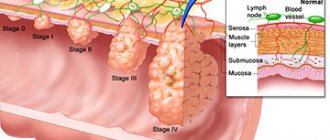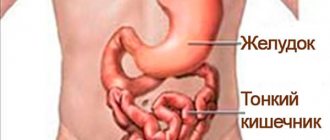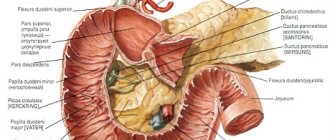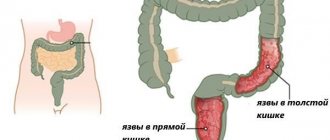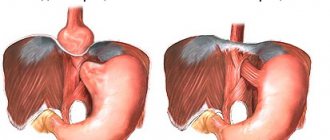What is small intestinal cancer
A malignant tumor of the small intestine is considered one of the most dangerous types of cancer due to its extremely poor prognosis for recovery and even five-year survival. It is distinguished from others by the location of the tumor - it is located in one of three sections of the small intestine:
- in the ileum;
- in the duodenum;
- in the jejunum.
The largest proportion of tumors in this part of the intestine is due to duodenal cancer (about more than half of all cases). Jejunal cancer is diagnosed slightly less frequently (about a third of all cases). The rarest type of small intestinal cancer is ileal cancer.
In the total number of oncological diseases of the digestive tract, cancer of the small intestine, the symptoms of which will be discussed further, accounts for no more than 4% of cases.
Possible causes of pathologies
Experts identify many factors that can cause the appearance of pathologies of the small intestine. These include:
- Nonspecific infections. When microorganisms invade the intestinal wall, inflammatory processes develop, which underlie the development of a serious disease - enteritis.
- Specific infections. Some bacteria have a special effect on the small intestine, which is characterized by the appearance of specific symptoms. Such infections are caused by salmonella, dysentery bacilli, and clostridia.
- Helycobacter pylori infestation. This microorganism is isolated separately, as it has great diagnostic value. It has been established that the proliferation of bacteria in the duodenum (the initial part of the small intestine) leads to the appearance of erosions in the wall of the organ. This effect underlies the development of peptic ulcer disease.
- Presence of helminths. The most common parasites of the small intestine are roundworms and giardia. They attach to the wall of the organ, as a result of which the functioning of its mucous membrane is disrupted. The pathological process is accompanied by an active immune response to the introduction of the helminth, which further aggravates the course of the disease.
- Lesions of neighboring organs. Inflammatory processes from some parts of the digestive tract can spread to others. So, with a long course of gastritis (inflammation of the stomach), pathological changes spread to the small intestine, and the patient develops gastroenteritis. In patients with chronic colitis (inflammation of the large intestine), enterocolitis may occur.
- Chemical influences. Damage to the small intestine can occur due to toxic substances. When phosphorus, lead, or arsenic enter the digestive system, the normal functioning of the organ mucosa is disrupted, which leads to a deterioration in the general condition of the body.
- Use of certain groups of drugs. Certain medications have strong side effects that affect the digestive system. When exposed to them, ulcers of the small intestine can occur, a dangerous complication of which is intestinal bleeding. This effect can be observed with long-term use of salicylic acid preparations, uncontrolled use of antibiotics, and long courses of cytostatics.
A common cause of diseases of the small intestine can be perverted immune reactions. This group includes allergic and autoimmune responses of the body, which lead to damage to the body's own intestinal cells.
Be sure to read:
Duodenal ulcer: how is the pathology manifested and treated?
Why does small intestine cancer occur?
The exact causes of oncological formations in the small intestine have not yet been clarified. However, reliable data have confirmed that this disease in most patients develops against the background of chronic pathologies of the gastrointestinal tract, as well as during inflammatory processes occurring in various parts of the intestine. Experts suggest that small intestine cancer can occur due to the following ailments:
- duodenitis;
- colitis;
- enteritis;
- peptic ulcer;
- Crohn's disease;
- celiac disease;
- Peutz-Jeghers syndrome;
- benign formations in the intestines;
- genetic pathologies;
- malignant neoplasms of other internal organs.
The risk of getting a diagnosis increases if you have bad habits, poor diet (eating red meat, spicy, fatty and smoked foods and not having enough vegetables and fruits on the menu - sources of dietary fiber). Radioactive radiation can also provoke the transformation of cells into cancerous ones.
Causes of diseases of the small intestine
The causes of the problem can be identified using laboratory tests.
The most common provoking factors include the following negative phenomena:
- Hereditary predisposition is expressed in the inheritance of certain diseases of the digestive system and in genetically determined defects in genes that regulate the functioning of the gastrointestinal tract;
- Treatment with antibiotics. This group of drugs has a detrimental effect on the state of the microflora of the organ. Such treatment not only affects the quality of absorption of necessary substances, but also affects the immune system, which is very dependent on the functioning of the digestive system;
- Poor nutrition is one of the leaders among the phenomena that lead to dysfunction of the gastrointestinal tract. Eating large amounts of carbohydrates, monotonous food, fast food and other junk food cannot but affect the quality of the system as a whole and the integrity of the mucous membranes;
- Excessive alcohol consumption. Alcoholic drinks damage the mucous membranes of the small intestine and also lead to general intoxication of the body. These problems often provoke a significant deterioration in the health of the digestive system;
- Smoking is one of the most dangerous toxic addictions. It leads to disruption of the functioning of the entire body: due to disruptions in the respiratory system, the intestinal wall does not receive enough oxygen. This leads to serious pathologies;
- Insufficient physical activity. This factor leads to intestinal motility being disrupted, which means that nutrients are less well absorbed and pathologies of this organ occur;
- Eating poor quality food. In this case, we are talking about the fact that the products consumed must meet the standards of freshness and quality of raw materials, meet the requirements of temperature treatment and be consumed exclusively with clean hands. This protects against intestinal infections, which can lead to serious complications.
These reasons lead to pathologies of many organs of the digestive system. The small intestine is no exception. However, due to the importance of this organ, violation of certain rules can lead to very serious health problems.
Types of small intestinal cancer
To classify small intestinal oncology, several characteristics inherent to tumors are used:
- The growth pattern of cancer cells.
- Cellular structure of a cancer tumor.
Based on the nature of their growth, malignant tumors are divided into exophytic and endophytic. Both types of oncology have a number of features:
- Upon closer inspection, exophytic small intestinal cancer, which has signs and symptoms that differ in diagnosis and treatment from endophytic cancer, is a tumor that grows toward the inside of the intestine. Externally, they resemble mushrooms (with or without a stalk), plaques or polyps, and have clearly defined boundaries and a bumpy surface. This form most often causes intestinal obstruction.
- Endophytic cancer of the small intestine is a tumor without a clearly defined border and looks like a diffuse formation. A tumor of this type penetrates all layers of the intestine through the lymphatic network, and more often than others causes intestinal perforation and heavy bleeding.
Based on cell structure, small intestinal cancer is divided into the following types:
- adenocarcinoma - formations localized on glandular tissues in the area of the duodenal papilla of the duodenum (in other parts of the small intestine this type of tumor is very rare);
- carcinoid - tumors formed from epithelial tissues, and, in addition to the ileum, can occur in other parts of the small and large intestines;
- lymphoma is the rarest type of tumor of the small intestine, which is represented by lymphogranulomatosis and pathology known as Hodgkin's disease;
- leiomysarcoma - tumors that grow to large sizes, which are easily palpated through the abdominal wall and often lead to intestinal perforation.
Risk factors
Cases of sporadic or familial adenomatous polyposis are increased risk factors for developing small intestinal cancer. The risk of developing small intestinal cancer is higher in:
- Smokers;
- Persons exposed to radiation;
- Suffering from alcohol addiction;
- People whose diet is dominated by animal fats, canned foods, and fried foods.
Based on the nature of the growth of tumor tissue, exophytic and endophytic cancer of the small intestine are distinguished.
- Exophytic tumors grow into the intestinal lumen, causing its narrowing and the development of intestinal obstruction; macroscopically may resemble a polyp or cauliflower;
- Endophytic forms of cancer infiltrate the wall of the small intestine in depth, accompanied by intestinal bleeding, perforation and peritonitis.
According to the histological structure, malignant tumors of the small intestine are more often represented by adenocarcinoma; sarcomas, carcinoids, and intestinal lymphoma are less common in oncological practice.
The Yusupov Hospital successfully treats patients diagnosed with small intestinal cancer. Here you will be consulted by highly qualified doctors and will conduct diagnostics using modern equipment. Timely visit to the hospital and detection of small intestine cancer at an early stage guarantees the maximum effect of treatment.
Make an appointment
Stages of small bowel cancer
Cancer of the small intestine, as well as its other parts, goes through 4 stages in its development:
- The first stage is when the tumor diameter is less than 20 mm. There are no or very mild symptoms. The tumor body is localized on the wall of the small intestine; there is no metastasis.
- The second stage – the tumor increases in size slightly. Symptoms are more pronounced due to the fact that the neoplasm grows into adjacent tissues and/or protrudes into the intestinal lumen. there are no metastases.
- The third stage - the formation greatly increases in size and begins to metastasize to the lymph nodes located in close proximity to the tumor. The symptoms are severe.
- The fourth stage - the tumor actively grows into neighboring organs, and also gives numerous metastases in the liver, pancreas, genitourinary system, and lungs. Symptoms become extremely severe.
Vascular lesions of the small intestine
With atherosclerosis, all the vessels of the patient are affected by plaques. Their lumen noticeably narrows, which means much less blood flows. The intestines are in a state of constant oxygen starvation. The disease manifests itself as abdominal pain. They start in the central region and then spread to the entire abdomen. Occurs after eating for 30 minutes to one and a half hours. During this period, the intestines work at their maximum, and the need for oxygen increases. The pain in this condition is severe. Patients are afraid of their recurrence and refuse to eat. In addition to pain, intestinal disorders occur. This disease is very dangerous, since as atherosclerosis of the arteries progresses, their complete blockage can occur with further death of part of the intestine.
Symptoms of small intestine cancer
Recognizing small intestinal cancer, the symptoms of which vary depending on the stage of the disease, is very difficult at first, because this type of disease is characterized by a complete absence of symptoms in the initial stages of development of the pathological process. Noticeable signs appear only when the tumor leads to the appearance of ulcers or narrows the intestinal lumen.
Symptoms of early stage cancer:
- nausea and belching;
- diarrhea or constipation;
- heaviness in the stomach;
- bloating;
- spasmodic abdominal pain.
As the tumor grows, the clinical picture expands, and difficulties with bowel movements due to false urges to defecate and/or partial or complete intestinal obstruction, intestinal bleeding and severe abdominal pain are added to the reported symptoms.
Along with this, patients experience a number of common symptoms:
- increasing weakness;
- fatigue and general ailments;
- loss of appetite or aversion to food;
- sudden weight loss;
- anemia and resulting pallor of the skin and mucous membranes;
- dizziness;
- persistent increase in body temperature to subfebrile levels.
Symptoms of intestinal diseases
The most common is indigestion. It manifests itself as follows:
- stool disorder. The frequency of defecation reaches 5-6 times a day, the volume of stool is increased, and remnants of undigested food can be seen in it. With serious damage to the intestines, blood and mucus are present in the stool;
- the occurrence of rumbling intestines, bloating;
- pain. Painful sensations are located in the umbilical region, or slightly to the right. The pain is not acute, it is constant, dull, and decreases after the passage of gas. If intestinal motility is increased, the pain becomes stabbing in nature.
In addition to intestinal symptoms, there are also general signs of the disease. As a result of chronic malabsorption of substances, their artificial deficiency occurs. Food enters the body, but is not absorbed. This causes the patient to lose weight against the background of normal nutrition, the occurrence of hypovitaminosis, and anemia. Deficiency of fat-soluble vitamins K, A, E, D leads to poor vision, increased bone fragility, disruption of the menstrual cycle in women and sperm count in men. Dry skin occurs, microcracks appear on it, and jams appear in the corners of the lips. With a deficiency of microelements, iron and calcium are not supplied. The hematopoietic system suffers and osteoporosis occurs.
If the intestinal disease is acute, the patient experiences only intestinal disorders. Due to the short duration of symptoms, deficiency of vitamins, nutrients and macroelements does not have time to occur.
There are many chronic diseases of the small intestine.
Diagnosis of small intestine cancer
The most informative methods by which small intestinal cancer can be detected are signs and symptoms, diagnosis using modern technologies. The first allows one to suspect oncology and guess the location of the tumor. Diagnostics using special equipment helps to reliably establish the location of a malignant formation, determine its type and structure, degree of development, and much more.
The most informative methods are:
- a screening test for intestinal cancer (stool for occult blood - Colon View immunochemical test) helps to detect oncology at an early stage, since with small intestinal cancer, obvious blood in the stool appears only with heavy bleeding, but most often the bleeding occurs in small quantities, invisible the eye, so an analysis for occult blood in the stool allows one to suspect the disease;
- fibrogastroduodenoscopy;
- contrast fluoroscopy;
- irrigoscopy;
- colonoscopy;
- histological examination of tumor samples;
- Ultrasound of the abdominal cavity;
- MCT of the abdominal cavity and others (it is better to write simply CT of the abdominal cavity)
A number of additional laboratory tests of blood and urine are also carried out to determine specific antigens, indican and tumor markers in the body.
Treatment of small intestine cancer
The most effective treatment for small intestinal cancer is surgical excision of the tumor. During the procedure, the affected parts of the intestine and other organs (in whole or in part) - the gallbladder, pancreas, part of the stomach - can be removed.
Additionally, chemotherapy may be used. In some cases, this method plays a leading role (when the tumor is inoperable). In addition, treatment of small intestinal cancer can be carried out using radiation therapy.
In the postoperative period, the patient is prescribed a combination of medications and chemotherapy to completely eliminate cancer cells. In most cases, several such courses are required for recovery or stable remission.
Prevention of small intestinal cancer
It is impossible to reduce the risk of small intestinal cancer to an absolute minimum, but there are a number of preventive measures that help avoid the formation of tumors in the intestine:
- Regularly undergo preventive examinations in a specialized clinic.
- Adhere to the principles of a healthy lifestyle and nutrition.
- Treat diseases of the gastrointestinal tract promptly and completely.
- An annual stool test for occult blood (Colon View test, which can reliably detect occult blood in the stool and detect bowel cancer at an early stage).
- Consult a doctor if any alarming symptoms from the digestive system appear.
You can complete the last point now. At the bottom of the article there is a form for contacting our specialists - gastroenterologists and proctologists. They are ready to answer questions you ask them about the symptoms and presentation of small intestinal cancer. To do this, just fill out the appropriate form and indicate your email address.


